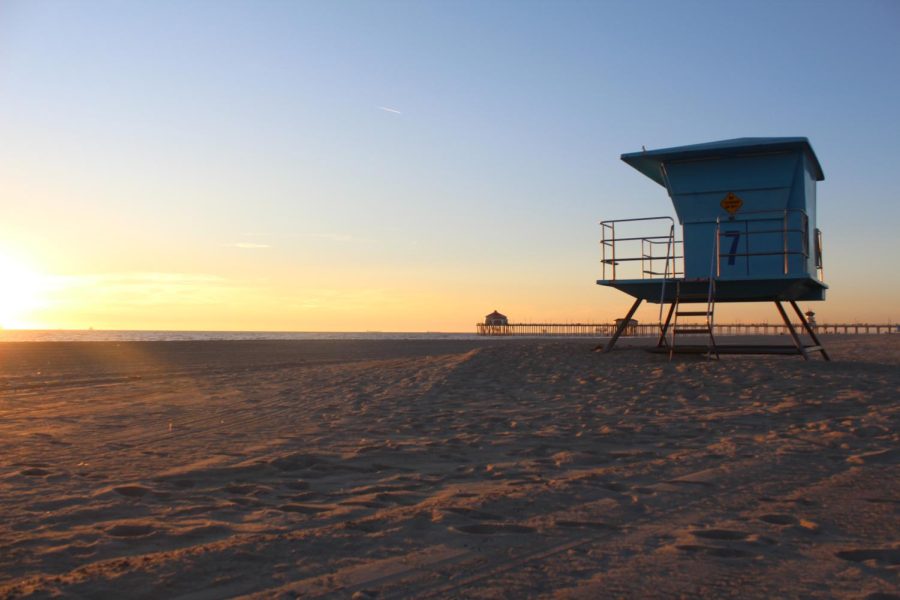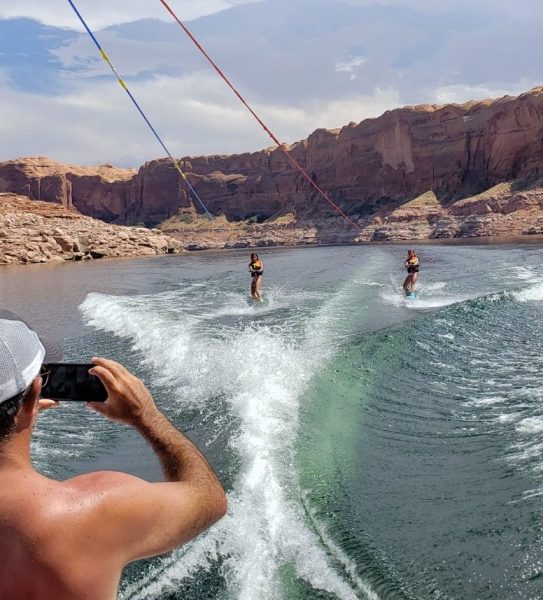What It’s Like Being A Female Lifeguard
Photographed by Charlotte Nguyen
A picture of Tower 7 at Huntington beach’s city beach. (Photography by: Charli Nguyen)
Lifeguards are essential to the safety of locals and visitors within the Huntington Beach community. However, female lifeguards are often treated differently than their male coworkers. In the past, beachgoers have even compared female lifeguards to certain characters in Baywatch films and undermined their abilities due to their appearance.
A former Huntington Beach High School (HBHS) student and lifeguard at Huntington Beach City Beach who wished to remain anonymous said, “I am taken seriously by my amazing coworkers and bosses. However, beachgoers are sometimes much less kind and can be less willing to listen because I am a girl, especially older men.”
Regardless, women aren’t the only lifeguard who feels this way. Current HB city lifeguard, Grace Brem, feels undermined and not taken seriously due to her gender as well. Brem says, “Some people I have to talk to on the beach don’t listen to me because I’m a female and they think they know more than me. Any other time I feel that I am taken seriously, so it doesn’t bother me. I can’t take things people say personally.”
Another anonymous HBHS alumni, a sophomore in college who comes back to HB every summer to lifeguard at HB state beach, has also stated that due to their more petite appearance, they are perceived differently, specifically by male visitors. “For me, the biggest challenge was not being taken seriously right away for unsound reasons. I graduated top of my academy in medicals, never missed a rescue, and learned all my codes right away but still felt that because I was a 16-year-old 5 foot 2 barely 110-pound girl that was often questioned and undermined when others who were less qualified were treated as more competent and confident. A lot of this stems from not having many girls around in general,” they said.
A current senior at HBHS and Huntington Beach city beach lifeguard, who also wished to remain anonymous, reported they’ve had to change their behavior while on the job. “My biggest challenge and something I’m still working on is my authority and confidence to get loud and make people listen and follow directions I’m giving them. No matter your tone there’s always people, mostly men, who refuse to believe you’re trying to help or believe they know better especially when being yelled at by what they see as a little girl,” they said.
Vanessa Barlett, a HB city lifeguard studying at the University of Southern California (USC), has also spoken out about beachgoers treating her differently while on the job. “When [lots of people] think of a “lifeguard” what immediately comes to mind is a tough, muscular man. So as a girl, I don’t really match that description. Maybe it’s because I don’t appear as tough as other male guards, that people don’t take me seriously, or at least don’t take what I have to say with the same authority. Because of that, I have to work much harder to establish a ‘commanding presence’ so that people listen to me and move from danger,” Bartlett stated.
Due to the lack of trust in female lifeguards, these women have to take a more stern approach than they usually would.
Trina Beebe, a student at the University of California San Diego (UCSD), spends her summers lifeguarding for the HB city beaches. Beebe recalled that she has had to act more assertively than she naturally is in order to be respected while on the job.
“Overall, as a female guard, my experiences working as a lifeguard have been different to male guards because of how approachable I am compared to the guys and how much people underestimate me for being a young woman,” Beebe said.
Beebe continued, “When warning people to get out of the water because I noticed a rip current was behind them, I’ve had many grown men tell me to go away because they do not believe what I say. I have to utilize a loud assertive voice in order to be heard. Those who neglect what I say because I am “just a girl” end up being rescued soon after, all of which are undoubtedly shocked that I could pull them out of the water and was telling the truth.”
The issue persists in different ways. In addition to having their authority questioned, many female HB lifeguards have encountered inappropriate comments. From comparisons to Baywatch to being pursued by older men, these lifeguards are forced to ignore what’s being said to them and continue working in order to stay safe.
A current HB city lifeguard and HBHS student, Ava Guard, has shared her story about her encounters with uncomfortable situations. “One of the biggest challenges I’ve faced as a female lifeguard has been having to deal with intoxicated people, usually men, who say inappropriate comments, or put me in an unsafe situation. One time I told these two intoxicated men to get out of a rip current and had to help them get [to shore]. They kept getting really close to me and then started following me back to my tower and yelling inappropriate comments at me that made me really uncomfortable. Luckily, there was a male lifeguard with me in my tower that day, and he saw what was happening and stood between the intoxicated men and me, but this made me upset because they didn’t listen to me when I told them to stop or stay away, but listened to the male lifeguard who was only a year older than me,” Guard said.
Guard continues, “I have also gotten many unwanted comments toward me as a female lifeguard because I [am] a woman. I had two men follow me and say they needed “mouth to mouth” when I didn’t respond they started to yell very inappropriate comments that I don’t want to repeat, but I felt very unsafe.”
Vanessa Bartlett, a previous lifeguard, has also stated that she was compared to Baywatch’s Pamela Anderson. “Once, when I was trying to move a guy from a rip current, he wouldn’t turn around to look at me when I was addressing him. When he finally turned around he just looked at me and asked, ‘Who are you? Pamela Anderson?’ He wouldn’t budge so I had to go back to my tower. I think that captures the struggles of female lifeguards pretty well,” Bartlett said.
Beebe also said, “The male guards don’t have this problem, as their presence as men already give them the validity as a professional guard that female guards are neglected.”
The gap between the way female and male lifeguards are treated is easily noticeable.
Guard has stated that she could be standing right next to a male lifeguard and a person can treat them with the utmost respect while she has to tolerate inappropriate comments by the same person. “Although most people are respectful, I’ve had my share of weird or rude comments that male guards don’t experience. I’ve had people question my strength and capabilities more times than I can count and even if it’s meant to be a joke, I know they wouldn’t question my male coworkers,” Guard said.
Thankfully, the lifeguarding departments within HB do their best to bridge as best they can.
“For the most part, I feel like my experience within the department has been similar to that of my male coworkers, as everyone is on the same team, receives the same training, and is treated as equals by our chiefs and bosses. When it comes to the differences, I see the most contrast when it comes to the respect given by people outside the department,” an HBHS student lifeguard stated.
The agencies of HB city and state lifeguards also try to do everything within their power to keep their female lifeguards safe. Guard said, “In regards to my agency, I definitely feel like I am taken seriously which is very much appreciated. When I am having a bad day at work, most of the male lifeguards I have worked with understand what female lifeguards go through. They are also good at making sure those people don’t get near me or hurt me in any way, which is why I love how much work the agency puts into making sure I was okay after I dealt with these [types of] situations, especially since it was my first year as a lifeguard,” Guard said.
Guard has mentioned that even though there is a gender gap between lifeguards, she hopes respectful beachgoers continue to inspire others to do the same. “Even if we can’t bridge the gap easily, having those people who treat you nicely or say a comment that makes your day can help me to deal with those people who make my day harder,” Guard said.
Bartlett said, “The department itself doesn’t treat girls much differently, but I feel they are a bit more sensitive with us. Like if a big rescue or medical call happens, some supervisors are more attentive to the girls to make sure that we’re emotionally alright before returning back to work.”
It is important that those who visit the beach are respectful to the public servants who put their lives on the line for others. Despite appearances or gender, everyone should be treated with equal amounts of respect.
Your donation will support the student journalists of Huntington Beach High School. Your contribution will allow us to cover our annual website hosting costs.
Thank you for supporting our program!







